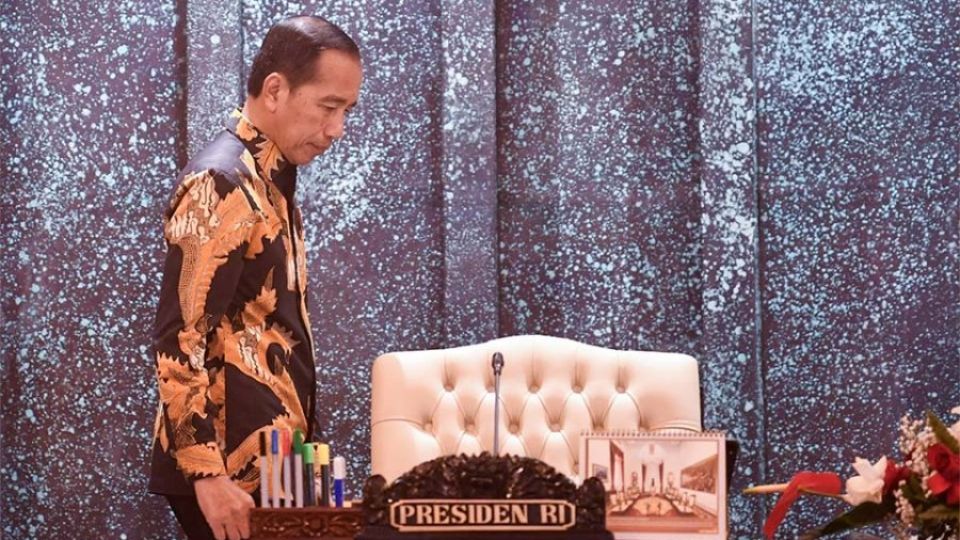October 24, 2024
JAKARTA – Former president Joko “Jokowi” Widodo, who was once known for being straightforward and oriented toward social justice and human rights values, had in his second term shifted to a leadership style oriented toward capital owners and high-risk projects.
His ambitious decisions, such as the development of the Nusantara Capital City (IKN) project, reflect traits often associated with hubris syndrome. The syndrome occurs when someone in a position of power develops a magnified and embellished view of themselves and their capabilities, resulting in excessive self-confidence, obsession with personal image and contempt for criticism.
Jokowi began his first term as president (2014-2019) with widespread praise for his humble and people-focused leadership. He shortened bureaucratic chains, made promises to resolve human rights cases for victims and their families, placed pro-democracy activists in his circle and formed a cabinet team based on recommendations from the Corruption Eradication Commission (KPK).
He prioritized infrastructure projects outside Java in his development program. They included the Trans-Sumatra toll road, the construction of the MRT system, seaports, airports and public housing development. The power of social media help boost his popularity whenever he inaugurated infrastructure projects and visited regions. His approach, in direct contact with the people in the region, positioned him as a leader who understood the needs of the people.
However, in his second term (2019-2024), Jokowi took a more ambitious and politically and economically riskier approach. He began to consolidate power by embracing political opponents, focusing less on human rights issues and corruption eradication, strengthening family political networks, ignoring public participation and liberalizing the economy.
He pushed the Job Creation Law to liberalize the economy and the job market with the support of his ruling coalition members in the House of Representatives. He championed the revision of the KPK Law to weaken the anti-graft agency. Jokowi also accelerated the IKN project’s construction.
The change in the style and direction of Jokowi’s leadership is one of the indications of hubris syndrome. Hubris is an occupation hazard for all leaders in business, the military and politics.
In The Hubris Syndrome: Bush, Blair and the Intoxication of Power (2012), David Owen included president Bush Jr. and prime minister Tony Blair into the category of leaders who experienced disorders that were later called hubris syndrome.
Owen and Graham Robinson (2009) then researched 18 US presidents and 26 British prime ministers since 1908. They formulated 14 indicators of hubris syndrome, including narcissism, image enhancement, concern with image, contempt for advice, impulsiveness and moral righteousness. The research concluded that hubris syndrome was often preceded by a period of “great success” but that success did not always cause leaders to have hubris syndrome.
They found that of the heads of government studied, only five had hubris syndrome, including former US president George W. Bush and former UK prime ministers Tony Blair, Neville Chamberlain and Margaret Thatcher.
In the case of George W Bush, his quick response in dealing with the 9/11 terrorist attacks received praise from the American people. His decision to invade Afghanistan and oust the Taliban regime in 2001 in return also provided political incentives for Bush. His confidence is growing, making him ignore objective views and facts.
One of the fatal and long-lasting decisions for political stability in the Middle East was his decision to invade Iraq in 2003. Although he knew that Iraq did not have weapons of mass destruction, the invasion of Iraq was realized.
Thatcher also experienced extraordinary and significant success. Under her leadership, the UK was able to retake the Falkland Islands from Argentina in 1982. The military victory was widely celebrated in the UK and greatly boosted her popularity at home. This strengthened her image as a strong and decisive leader.
Thatcher went on to win three consecutive elections (1979, 1983 and 1987) and her confidence was strengthened. She no longer listened to the advice of the political circles that supported her.
She decided to establish a flat tax (Poll Tax) that would benefit the upper-middle class in Britain. Her uncompromising attitude sparked mass protests that led to her ouster by her party in 1990.
Jokowi’s decision to relocate the capital city may be an indication of hubris syndrome. His attitude of forcing the IKN project to run indicates his overconfidence despite public criticism. This confidence cannot be separated from his high level of popularity throughout his presidency. A Kompas survey found that Jokowi’s popularity increased from 58.8 percent in October 2019 to 70.1 percent in May 2023.
The success of the first term of leadership and the conquest of his political opponents at the beginning of the second term have obscured objective considerations and distanced Jokowi’s assessment of the reality. The IKN project cost the country Rp 72 trillion (US$4.57 billion) from 2022 to 2024.
Another similarity of these figures is that hubris syndrome develops in leaders who hold too much power in a political system that lacks counterweight power to limit their expansive power. They are surrounded mostly by flatterers rather than people who are willing to provide constructive criticism.
Owen observed that when leaders’ hubris syndrome started to develop, their empathy also started to diminish. Empathy, the ability to understand and share feelings with others, is essential for making balanced and inclusive decisions. As empathy diminishes, leaders increasingly rely on intuition, their feelings or instincts, rather than accepting criticism and input from others.
Intuition, while valuable, can be problematic when relied upon without the power of empathy. Although Jokowi’s achievements cannot be ignored, his decisions in his controversial second term should lead to common reflection. The return of a more grounded leadership, with a willingness to listen to dissenting voices, is essential to ensure that every public decision has gone through a process of dialogue and rational thinking.


